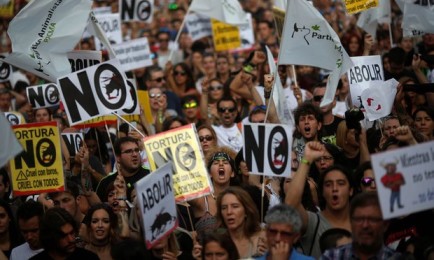
Over the past few days, many hundreds of thousands of Spaniards have marched on matters close to their hearts. This is entirely normal behaviour for the majority.
Despite enjoying a booming year for tourism, a strengthening economy and the sight of its political leaders caught in an unedifying limbo, many Spaniards still have their grievances, not least regarding two of the country’s thorniest issues: Catalonia’s yearning for independence, and bullfighting…
On Sunday it is estimated that 540,000 people attended a rally in Barcelona in support of the introduction of a legally binding referendum on the independence issue. The leader of the Catalan separatists Carles Puigdemont has targeted 2017 as the date by which Catalans are allowed to vote on whether to break away from Spain.
Madrid has always put up roadblocks to this end, and will do so again. However, just because it looks like a battle that Catalonia cannot win, does not stop people from trying. Catalan National Day is annually used as a means to stir up more support, and the fact that a non-legally binding vote held in 2014 found that 1.6 million Catalans would be in favour of independence is proof that the movement has valid grounds for protest.
It is something about the Spanish – and Catalan, of course – psyche that sees opposition to perceived injustices as a collective value, and means that Spain often thrums to the sound of marches and protests many weeks of the year.
Another protest held this week in Madrid, the nation’s capital, is something close to the hearts of not just millions of Spaniards, but millions of people around the world – bullfighting. The controversial pastime has its vocal supporters, of that there is no doubt, but in many corners of an increasingly liberal, modern Spain, the bloodsport is viewed as a cruel anachronism with no place in today’s society.
They numbered in their thousands as they marched along Madrid’s streets, declaring that “If bullfighting represents Spain, then we are not Spanish”, which is an interesting interpretation of history, but no less valid. If the Spanish no longer identify en masse with something that has for generations been used as a signifier of Spain and the Spanish people, then what validity does it have left?
But it appears that, despite or perhaps because of such protests, appetite for bullfighting is on the wane across the country. In 2015 ‘only’ 1,736 bullfights were staged nationwide, which was 132 less than in 2014. Tradition or no, Spaniards are seemingly turning away from the spectacle, and it is often apathy, rather than opposition, that is more deadly.
Whether Madrid’s vehement opposition to Catalan independence eventually slides into apathy, however, is something entirely less likely altogether.
 en
en



 Vlaams-Nederlands
Vlaams-Nederlands
0 Comments
Leave a Comment
DISCLAIMER
The opinions and comments expressed by contributors to this Blog are theirs alone and do not necessarily reflect the views of VIVA Homes Under the Sun Ltd, any of its associated companies, or employees; nor is VIVA to be held responsible or accountable for the accuracy of any of the information supplied.
Have you got something to say?